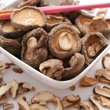
While mushrooms have been used in traditional medicines for centuries, they’re increasingly the focus of clinical research. From cognitive function to cancer to COVID-19, there’s a lot of buzz around using mushrooms for a long list of conditions. We recently updated all of our mushroom monographs – here are some notable highlights.
You’ve probably heard about lion’s mane mushroom. Most of the coffee alternative products claiming to boost memory and focus include lion’s mane mushroom as a key ingredient. And it’s increasingly promoted for improving cognitive function in memory support supplements. The uptick in these products doesn’t exactly correlate to an increase in supportive clinical evidence. A recent study in younger adults shows that taking lion’s mane mushroom for 4 weeks doesn’t improve cognitive function. This aligns with an earlier small clinical trial in middle-aged to older adults showing no benefits after 12 weeks. It’s possible that these studies were too small to detect differences, but the overall evidence remains unclear.
Along with many other mushrooms, shiitake and maitake mushrooms are of interest for use in cancer care. Recent clinical research in patients with laryngeal or pharyngeal cancer shows that taking maitake mushroom extract 3 times daily during chemotherapy treatment modestly improves survival over 5 years. And a small clinical trial in adults with pancreatic cancer shows that taking shiitake mushroom extract daily for 8-12 weeks reduces reported taste changes from chemotherapy treatment by 27%, but it’s not clear if these effects are clinically significant. The overall evidence on most mushrooms for cancer and treatment-related side effects is unclear. Turkey tail mushroom still has the strongest supportive evidence in this area – it contains polysaccharide krestin (PSK), which might improve survival rates when used along with standard care.
If patients ask you about the benefits of mushrooms, explain that the evidence varies by individual species. And it’s often the isolated extracts of specific mushrooms with supportive evidence rather than whole mushrooms. There are also product labeling issues – sometimes products only contain cells from the mycelia, or fungus root structure, not full-grown mushrooms. This means extracts used in these products might not be the same as those studied. Reiterate that many of the claims made online aren’t backed by strong evidence – some of the recent buzz around its use in COVID-19 is a good example. Check out our recently updated mushroom monographs to learn more about specific species, including details on safety and interactions.
The information in this brief report is intended for informational purposes only, and is meant to help users better understand health concerns. This information should not be interpreted as specific medical advice. Users should consult with a qualified healthcare provider for specific questions regarding therapies, diagnosis and/or health conditions, prior to making therapeutic decisions. Copyright © 2024 NatMed. Commercial distribution or reproduction prohibited. NatMed is the leading provider of high-quality, evidence-based, clinically-relevant information on natural medicine, dietary supplements, herbs, vitamins, minerals, functional foods, diets, complementary practices, CAM modalities, exercises and medical conditions. Monograph sections include interactions with herbs, drugs, foods and labs, contraindications, depletions, dosing, toxicology, adverse effects, pregnancy and lactation data, synonyms, safety and effectiveness.
